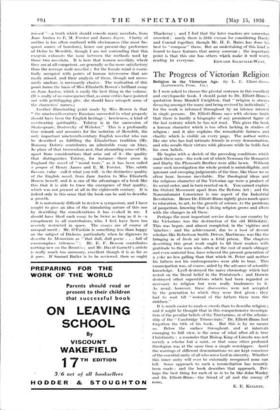The Progress of Victorian Religion
IF I were asked to choose the pivotal sentence in this excellent and encylopaedic book, I should point to Dr. Elliott-Binns's quotation from Mandell Creighton, that " religion is always decaying amongst the many and being revived by individuals" ; for the work is informed throughout by an intense interest in single persons. Dr. Elliott-Binns says with obvious truth that there is hardly a biography of any prominent figure of the last century which he has not read. This gives.the book a human character which is too often lacking in studies of religion : and it also explains the remarkable fairness and charity which is visible on every page. The author writes like one who has had intimate friends in every denomination, and who recalls their virtues with pleasure while he holds fast his own beliefs.
He begins with a sketch of the preceding conditions which made these ►nen—the rock out of which Newman the Romanist and Darby the Plymouth Brother were alike hewn. Without some such investigation the whole period is unintelligible, and ignorant and sweeping judgements of the time, like those we so often hear, become inevitable. The theological ideas and the religious character of the Victorian age were a product of its social order, and in turn reacted on it. You cannot explain the Oxford Movement apart from the Reform Act ; and the Nonconformist Conscience is one aspect of the Industrial Revolution. Hence Dr. Elliott-Binns rightly gives much space to education, to art, to the growth of science, to the problems of pauperism, knowing that a living religion grows and alters with the changes in all these.
Perhaps the most important service done to our country by the Victorians was the destruction of the old Bibliolatry. This was begun; and almost completed, in the 'eighties and 'nineties : and the achievement, due to a host of devout scholars like Robertson Smith, Driver, Martineau, was like the bringing in of fresh air into a fetid prison. The chapters describing this great work ought to fill their readers with gratitude to the men who, often at the cost of much obloquy and even material loss, have relieved the present generation of a yoke no less galling than that which St. Peter said neither his fathers nor his contemporaries were able to bear. This emancipation was, of course, aided by the advance of scientific knowledge. Lyell destroyed the naive .chronology which had rested on the literal belief in the Pentateuch ; and Darwin destroyed other superstitions which had been regarded as necessary to religion but were really hindrances to it. As usual, however, these discoveries were not accepted by the generation to which they were first given : they had to wait till " instead of the fathers there were the children.".
. It is much easier to analyse creeds than to describe religion ; and it might be thought that in this comprehensive investiga- tion of the peculiar beliefs of the Tractarians, or of the scholar- ship of the Cambridge Triumvirate," Dr. Elliott-Binns had forgotten the title of his book. But this is by no means so. Below the surface throughout, and at intervals emerging to full view, is the sense of what after all is true Christianity : a reminder that Bishop King of Lincoln was not merely a scholar but a saint, or that some other profound theologian was at the same time a simple worshipper. Amid the warrings of different denominations we are kept conscious of the essential unity of all who serve God in sincerity. Whether this inner unity will ever be externally recognised none can tell. Some approach to such a reconciliation has recently been made : and the book describes that approach. Per- haps the best thing for each of us is to be like John Wesley and Dr. Elliott-Binns—the friend of all and the enemy of none.
E. E. ICELLETr.






















































 Previous page
Previous page